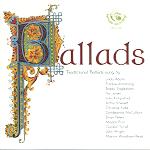> Folk Music > Records > Ballads
Ballads
 |
Ballads Fellside Recordings FECD110 (CD, UK, 1997) |
Produced and recorded by Paul Adams except
The Bonny Banks of Fordie
recorded by Bernard Whitty
and
Tam Lin
recorded by David Wood, Sound Services, Monmouth.
Tracks
- Gordon Tyrrall: Seven Gypsies (Roud 1; Child 200; G/D 2:278; Henry H124) (5.09)
- Gordeanna McCulloch: Mill o’ Tifty’s Annie (Roud 98; Child 233; G/D 5:1018) (7.06)
- Arthur Knevett: Lord Bateman (Roud 40; Child 53; G/D 5:1023; Henry H470) (4.23)
- Nic Jones: The Bonny Banks of Fordie (Roud 27; Child 14; G/D 2:199) (6.15)
- Frankie Armstrong: Tam Lin (Roud 35; Child 39; G/D 2:330) (9.57)
- John Wright: Matty Groves (Roud 52; Child 81) (6.29)
- Maddy Prior: Chyld Owlett (Roud 3883; Child 291) (3.32)
- Martyn Wyndham-Read: The Lover’s Ghost (Roud 179; Child 248) (5.39)
- John Kirkpatrick: Robin Hood Rescuing the Three Squires (Roud 71; Child 140; G/D 2:243) (8.02)
- Christine Kydd: Sheath & Knife (Roud 3960; Child 16) (7.38)
- Linda Adams: The Sun Shines Fair (The Cruel Mother) (Roud 9; Child 20; G/D 2:193; TYG 73) (3.46)
- Bobby Eaglesham: The Bonny House of Airlie (Roud 794; Child 199; G/D 2:233) (3.50)
- Brian Peters: Young Hunting (Roud 47; Child 68) (7.02)
Sleeve Notes
This is a selection of versions of songs collectively known as the “Big Ballads” (in Scotland they are also known as the “Muckle Sangs”). Many of the themes and even some of the words of the songs have very ancient origins. They are part of our folk culture having been kept alive by traditional singers over the generations.
One of Sir Walter Scott’s Scottish source singers for his Ballad collecting got rather cross when he showed her the texts which he had written down, she felt that he ruined them: “They were made for singing an no’ for writing down.” None of the people on this recording would disagree with that! The texts make fine narrative poems, but marry them with the majestic tunes with which they are associated, put them in the hands of singers experienced in performing ballads, who are gifted story tellers and you have a potent combination. Despite the old lady’s objections, if it was not for the collectors many of these songs might have been lost forever. By their nature the belong to “the people” and have been passed on in the oral tradition.
For a start they are a link with the ancient bardic traditions which go back in the mists of time. What made “the folk” interest in them? Quite simply they are good stories. Their themes are those which have fascinated people throughout the ages: tales of the supernatural, murder, forbidden love, tabloid crime, the doings of the high and mighty, championing the under-dog, tragedy, romance and gripping yarns. They have come under considerable threat from twentieth century culture and mass media, but they still have an appeal by the nature of their themes, there are still people wanting to perform them and an audience wanting to hear them. The mass media techniques, such as recordings, whilst threatening them on one hand provide access to them on the other.
The songs are remarkably tenacious: many of these stories are shared with various European countries and some even stretch to the orient. They travelled with colonists to various parts of the New World and south to Australasia. Sometimes they have fragmented and created new songs. They have been subjected to a variety of methods of presenting them from the straight-forward unaccompanied singer to full-blown rock treatment. All are equally valid: in the hands (or voice!) of a gifted unaccompanied performer the drama can be just as intense as the same ballad given dramatic effects with drums, wailing guitars and electronic gadgetry.
In this collection we have chosen to present the ballads simply, with the minimum of embellishment, and let the stories tell themselves. Scotland has been one of the most fertile regions for the preservation of the ballads (often the dialect gives them an archaic feel and adds to the drama) and it is sometimes forgotten that England has also carried some fine versions. We have included examples of Scots ballads here, but continuing the theme of pointing up the rich tapestry in the English tradition which we started with our Voices collection (FECD87) the majority of the songs are from English sources. We hope to add collections of Scottish ballads in the future.
The singers are some of the finest interpreters of the genre and as with our Voices collection you will hear a variety of approaches and vocal styles.
The greatest collection of ballads is that made by Professor Frances Child and the numbers allocated to each one are given against the titles here so that anyone wishing to delve more into the subject can have a point of reference.
© Paul Adams, 1997

